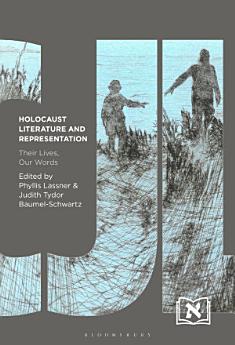Holocaust Literature and Representation: Their Lives, Our Words
Phyllis Lassner · Judith Tydor Baumel-Schwartz
Feb. 2023 · Bloomsbury Publishing USA
E-Book
258
Seiten
reportBewertungen und Rezensionen werden nicht geprüft Weitere Informationen
Über dieses E-Book
Each scholar working in the field of Holocaust literature and representation has a story to tell. Not only the scholarly story of the work they do, but their personal story, their journey to becoming a specialist in Holocaust studies.
What academic, political, cultural, and personal experiences led them to choose Holocaust representation as their subject of research and teaching? What challenges did they face on their journey? What approaches, genres, media, or other forms of Holocaust representation did they choose and why? How and where did they find a scholarly “home” in which to share their work productively? Have political, social, and cultural conditions today affected how they think about their work on Holocaust representation? How do they imagine their work moving forward, including new challenges, responses, and audiences? These are but a few of the questions that the authors in this volume address, showing how a scholar's field of research and resulting writings are not arbitrary, and are often informed by their personal history and professional experiences.
What academic, political, cultural, and personal experiences led them to choose Holocaust representation as their subject of research and teaching? What challenges did they face on their journey? What approaches, genres, media, or other forms of Holocaust representation did they choose and why? How and where did they find a scholarly “home” in which to share their work productively? Have political, social, and cultural conditions today affected how they think about their work on Holocaust representation? How do they imagine their work moving forward, including new challenges, responses, and audiences? These are but a few of the questions that the authors in this volume address, showing how a scholar's field of research and resulting writings are not arbitrary, and are often informed by their personal history and professional experiences.
Autoren-Profil
Phyllis Lassner is Professor Emerita in the Crown Center for Jewish and Israel Studies, Gender Studies, and Writing Programs at Northwestern University, USA. She is author of numerous books and articles on Holocaust literature and representation including as co-editor of the Palgrave Handbook of Holocaust Literature and Culture (2020).
Judith Tydor Baumel-Schwartz is Director of the Arnold and Leona Finkler Institute of Holocaust Research, the Abraham and Edita Spiegel Family Professor in Holocaust Research, the Rabbi Pynchas Brener Professor in Research on the Holocaust of European Jewry, and Professor of Modern Jewish History at Bar-Ilan University, Israel. She is also editor of several compilations of academic autobiographies, including co-editor of Her Story, My Story? Writing about Women and the Holocaust (2020).
Judith Tydor Baumel-Schwartz is Director of the Arnold and Leona Finkler Institute of Holocaust Research, the Abraham and Edita Spiegel Family Professor in Holocaust Research, the Rabbi Pynchas Brener Professor in Research on the Holocaust of European Jewry, and Professor of Modern Jewish History at Bar-Ilan University, Israel. She is also editor of several compilations of academic autobiographies, including co-editor of Her Story, My Story? Writing about Women and the Holocaust (2020).
Dieses E-Book bewerten
Deine Meinung ist gefragt!
Informationen zum Lesen
Smartphones und Tablets
Nachdem du die Google Play Bücher App für Android und iPad/iPhone installiert hast, wird diese automatisch mit deinem Konto synchronisiert, sodass du auch unterwegs online und offline lesen kannst.
Laptops und Computer
Im Webbrowser auf deinem Computer kannst du dir Hörbucher anhören, die du bei Google Play gekauft hast.
E-Reader und andere Geräte
Wenn du Bücher auf E-Ink-Geräten lesen möchtest, beispielsweise auf einem Kobo eReader, lade eine Datei herunter und übertrage sie auf dein Gerät. Eine ausführliche Anleitung zum Übertragen der Dateien auf unterstützte E-Reader findest du in der Hilfe.







